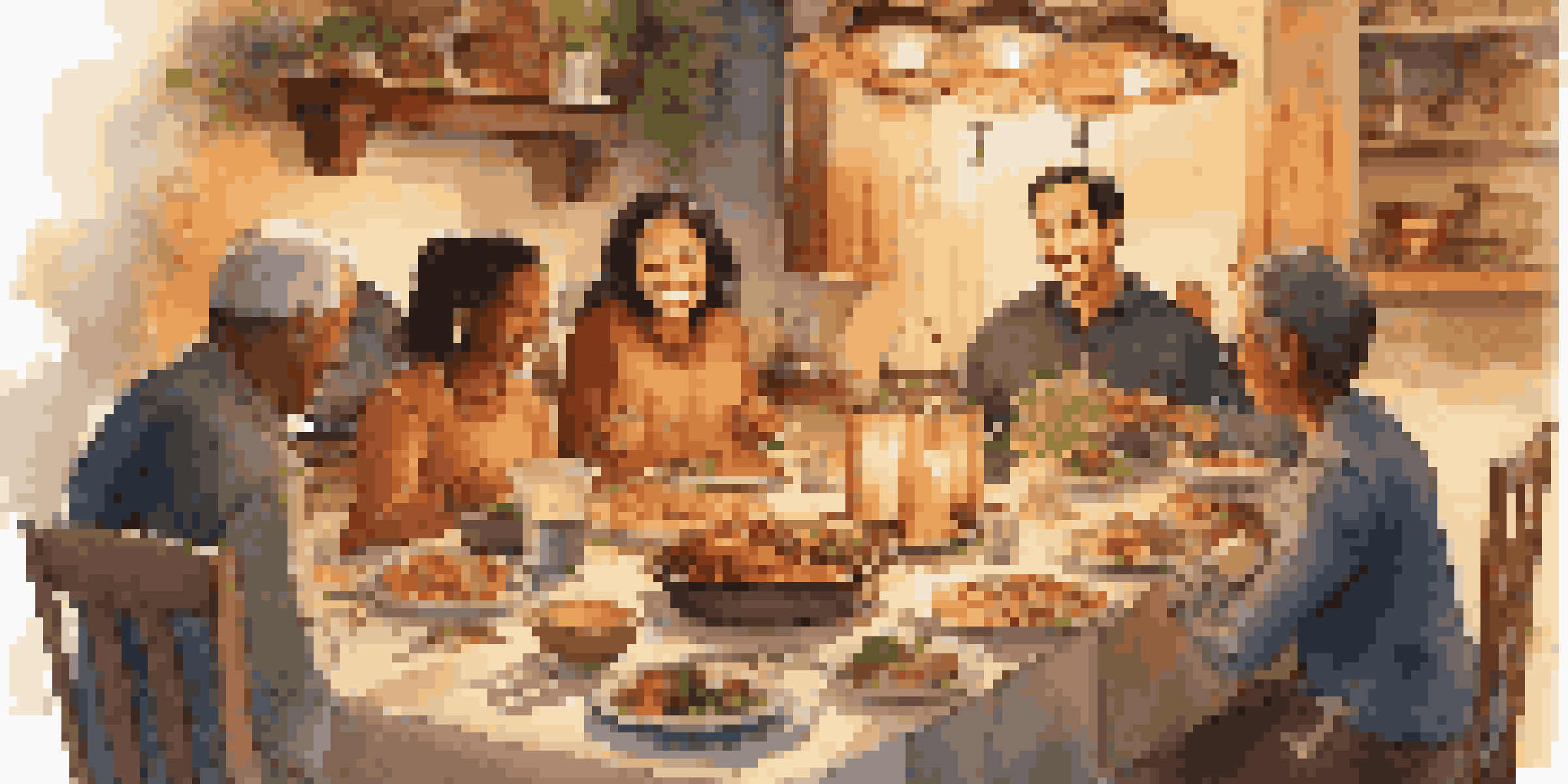Family Traditions: Understanding Local Cultures Through Kinship

What Are Family Traditions and Why Do They Matter?
Family traditions are the customs and practices that families uphold over generations. They can range from holiday celebrations to specific rituals or meals that bring family members together. These traditions help define a family’s identity and create a sense of belonging among its members.
Family traditions are the cornerstone of our identity.
Moreover, family traditions often reflect the cultural heritage of the community. For instance, a family might celebrate a unique festival that highlights their ancestry or cultural background. This connection to one’s roots can foster pride and an understanding of where one comes from.
Ultimately, these traditions serve as a bridge between the past and present, allowing families to pass down stories and values. They create lasting memories that influence how future generations view their culture and community, making them an essential part of any kinship.
How Traditions Differ Across Cultures
While family traditions play a similar role in many cultures, they can vary significantly in practice and meaning. For example, in many Hispanic cultures, the celebration of Quinceañera marks a girl's transition into womanhood, showcasing cultural values surrounding family and femininity. In contrast, a traditional American wedding might focus on different customs that symbolize the union in a more modern context.

These differences highlight the richness of cultural diversity. Each tradition is a reflection of the values, beliefs, and history of the people who practice them. By understanding these variations, we gain insight into how different communities interpret family and kinship.
Importance of Family Traditions
Family traditions create a sense of belonging and identity while connecting generations through shared values and stories.
Recognizing the nuances in family traditions encourages appreciation for diverse cultures. It helps foster respect and curiosity about how different societies function, ultimately promoting inclusivity and understanding in our increasingly interconnected world.
The Role of Food in Family Traditions
Food often plays a central role in family traditions, serving as a delicious vehicle for cultural expression. Think about how certain meals are prepared for holidays or family gatherings—these recipes are often passed down through generations. For example, an Italian family might gather to make homemade pasta, turning the cooking process into a cherished family event.
Traditions are our most treasured stories passed down through generations.
Food traditions are not just about the flavors; they represent shared experiences and memories. When families come together to cook or share meals, they strengthen their bonds and create a sense of community. Each bite carries a story, connecting generations through taste and aroma.
Moreover, these culinary customs can also act as a means of preserving cultural heritage. By preparing traditional dishes, families keep their cultural narratives alive, ensuring that future generations understand and appreciate their roots. It's a tasty way to cultivate kinship and cultural identity!
Rituals as Expressions of Family Values
Rituals—whether they are formal or informal—play a crucial role in reinforcing family values. A simple ritual like a family meeting every Sunday can establish open communication and a sense of unity. Such practices highlight what a family prioritizes, be it connection, support, or shared goals.
In more structured rituals, like a coming-of-age ceremony, families often emphasize values such as responsibility and respect. These events can mark significant life transitions while instilling essential lessons about family and society. The way these rituals are conducted also reflects the cultural significance behind them.
Cultural Diversity in Traditions
Family traditions vary significantly across cultures, reflecting the unique values and beliefs of different communities.
By participating in these rituals, family members often feel a stronger connection to their heritage and each other. They reinforce the values that families hold dear, creating a lasting impact on individuals as they grow and navigate their own lives.
Celebrating Milestones: Family Traditions in Action
Milestones such as birthdays, anniversaries, and graduations often bring family traditions to life. These celebrations usually incorporate unique customs that vary from family to family. For instance, some families might have a special birthday cake recipe that has been used for generations, while others may mark the occasion with a particular type of gathering.
These events not only celebrate individual achievements but also serve as reminders of the importance of family support. They create a space for loved ones to come together, share in the joy, and reflect on shared experiences. Each milestone becomes an opportunity to reinforce the family bond.
By observing how families celebrate these significant moments, we can gain insights into their cultural values and priorities. It's fascinating to see how a simple celebration can encapsulate a wealth of traditions and stories, enriching our understanding of different kinship dynamics.
The Evolution of Family Traditions Over Time
Family traditions are not static; they often evolve as society changes. New generations may adapt or reinterpret existing customs, blending them with modern influences. For example, a family might incorporate technology into their holiday celebrations, using video calls to include distant relatives, thereby expanding their traditions.
This evolution reflects the dynamic nature of culture and kinship. As families grow and diversify, their traditions can adapt to include new members, experiences, and perspectives. This flexibility allows traditions to remain relevant and meaningful across different contexts.
Evolving Traditions Over Time
Family traditions adapt to societal changes, blending modern influences with cultural heritage to remain relevant.
While some might view changes as a loss of heritage, they can also signify growth and resilience. By embracing new traditions, families can create a richer tapestry of experiences that honors both the past and the present, ensuring that their cultural narratives continue to thrive.
Passing Down Family Traditions to Future Generations
Instilling family traditions in younger generations is vital for cultural preservation. Parents and grandparents often take on the responsibility of teaching these customs, sharing stories and practices that shape identity. Engaging children in these traditions helps them develop a connection to their heritage.
One effective way to pass down traditions is through storytelling. Sharing anecdotes about how certain customs originated can spark interest and appreciation in younger family members. It transforms the act of participating into a meaningful experience, allowing them to see the value in what they are practicing.

Ultimately, the goal is to create a sense of continuity. By involving younger generations in family traditions, we ensure that they not only understand their cultural heritage but also feel empowered to carry it forward. This cyclical process of learning and sharing strengthens family bonds and enriches cultural narratives.